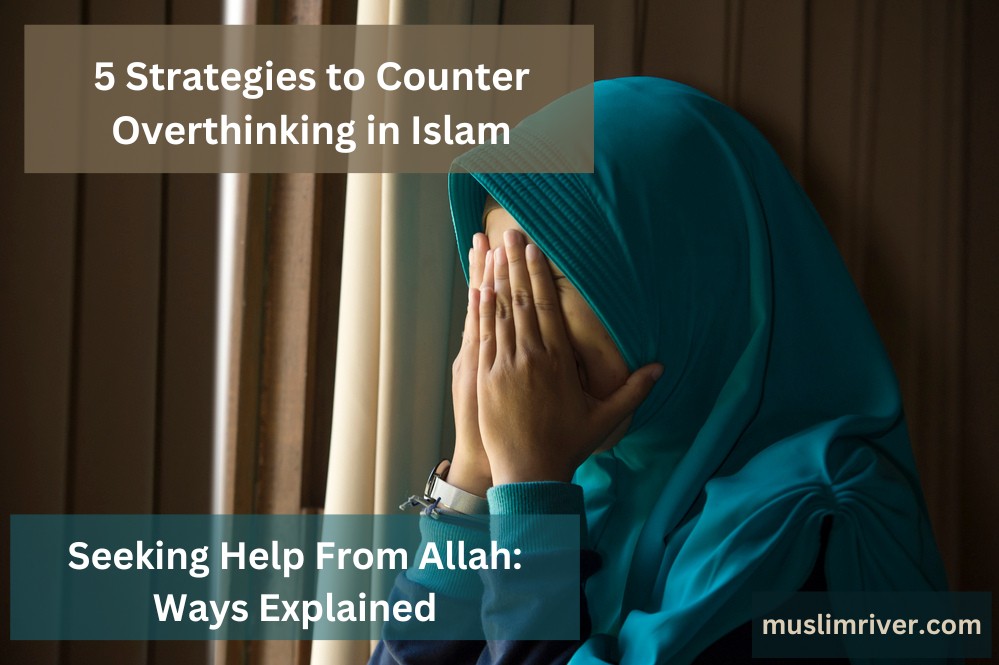How to Stop Overthinking in Islam?
Are you a Muslim finding yourself overthinking and worrying too much? You’re not alone. Mental health problems such as anxiety, depression, intrusive thoughts, and distress can cause us to spend excessive time dwelling in our minds, but it doesn’t have to be this way.
Islam provides powerful guidance on overcoming mental struggles, emphasizing mindfulness, kindness towards oneself, and positive self-talk.
We’ll explore the Islamic teachings that promote peace of mind, helping you break free from overthinking and reclaim your mental wellness.

5 Strategies to Counter Overthinking in Islam
Here are the 5 strategies to counter overthinking in Islam:
1. Turning to the Quran and Sunnah
Reciting the Quran and abiding by its teachings can assist us in liberating ourselves from our mental adversities. It reminds us of Allah’s adoration for us and His capacity to heal our wounds. The Quranic passages remind us that Allah will forever support us despite hardships.
‘Umar b. Khattab reported that there were brought some prisoners to Allah’s Messenger (ﷺ) amongst whom there was also a woman, who was searching (for someone) and when she found a child amongst the prisoners, she took hold of it, pressed it against her chest and provided it suck. Thereupon Allah’s Messenger (ﷺ) said:
Do you think this woman would ever afford to throw her child in the Fire? We said: By Allah, so far as it lies in her power, she would never throw the child in Fire. ‘ Thereupon Allah’s Messenger (ﷺ) said: Allah is more kind to His servants than this woman is to her child.
[Sahih Muslim 2754]Source: https://sunnah.com/muslim:2754
In Quran, Allah says:
وَإِذَا سَأَلَكَ عِبَادِى عَنِّى فَإِنِّى قَرِيبٌ ۖ أُجِيبُ دَعْوَةَ ٱلدَّاعِ إِذَا دَعَانِ ۖ فَلْيَسْتَجِيبُوا۟ لِى وَلْيُؤْمِنُوا۟ بِى لَعَلَّهُمْ يَرْشُدُونَ ١٨٦
“When My servants ask you ˹O Prophet˺ About Me”: I am genuinely near. I respond to one’s prayer when they call upon Me. So let them respond ˹with obedience˺ to Me and believe in Me; perhaps they will be guided ˹to the Right Way˺.
[Al Bakarah 2:186] Source: https://quran.com/2?startingVerse=186
2. Supplication (Dua): Seeking Help and Guidance from Allah
Allah is Almighty and Omniscient, granting us the fortitude and courage to conquer our inner battles through His limitless wisdom and power. He will provide us with the resources we need to persevere.
When we’re in distress, we should seek help from Allah through prayer and supplication (dua). We should remind ourselves that Allah will always be there for us no matter how hard things seem!
The Holy Prophet (S) said:
Abu Sa’id reported the Prophet as saying, “The believer and faith are like a horse with the stake to which it is tethered, which moves round and then returns to its stake, for the believer is negligent and then returns to faith. Feed the pious with your food and confer your kindness on the believers.” Baihaqi, in Shu’ab al-iman, and Abu Nu’aim, in al-Hilya, transmitted it.
[Mishkat al-Masabih 4250] Source: https://sunnah.com/mishkat:4250
3. Utilizing the Power of Dhikr :
Reciting brief phrases such as dhikr (or dua) can help us concentrate on Allah and give us a sense of inner strength when facing difficulty.
Dhikr is a powerful tool that can help us submit to Allah and relinquish our worries and fears. It brings awareness of our emotions so we have the power to control them. This ability empowers us to take charge of our lives with confidence!
By repeating phrases such as “SubhanAllah” (Glory be to Allah) or La illaha illallah (there’s no God but Allah), we can return to a humble state of being, strengthening our faith and trust in Him.
Dhikr, the remembrance of Allah, can be a powerful tool for spiritual growth and well-being. Reciting the names of Allah is a potent form of Dhikr that can have numerous benefits.
First and foremost, reciting the names of Allah can deepen one’s connection with Allah and increase one’s faith. When we recite Allah’s names, we are reminded of His many attributes and qualities, which can inspire us to be more mindful of our actions and more grateful for His blessings.
Reciting Allah’s names can also have a calming and soothing effect on the mind and body. This is because the names of Allah are associated with peace, mercy, and love, and reciting them can help us to feel more centered and grounded.
قُلِٱدۡعُواْٱللَّهَأَوِٱدۡعُواْٱلرَّحۡمَٰنَۖأَيّٗامَّاتَدۡعُواْفَلَهُٱلۡأَسۡمَآءُٱلۡحُسۡنَىٰۚوَلَاتَجۡهَرۡبِصَلَاتِكَوَلَاتُخَافِتۡبِهَاوَٱبۡتَغِبَيۡنَذَٰلِكَسَبِيلٗاSay, ˹O Prophet,˺ “Call upon Allah or call upon the Most Compassionate whichever you call, He has the Most Beautiful Names.” Do not recite your prayers too loudly or silently, but seek a way between.
[Al-Isra 17:110] Source: https://quran.com/17/110
4. Be Consistent With Prayers
Prayers are an integral part of Islam, and they can provide us with a sense of tranquility and peace of mind. Through prayer, we can learn to surrender our anxieties and accept the will of Allah. The more we pray, the closer we’ll get to Allah.
‘Abd Allah b. Buraidah said :
‘Imran b. Hussain asked the prophet (ﷺ) about the prayer a man offers in sitting condition. He replied: his prayer in standing condition is better than his prayer in sitting condition, and his prayer in sitting condition is half the prayer he offers in standing condition, and his prayer in lying condition is half the prayer he offers in sitting condition.
[Sunan Abi Dawud 95] Source: https://sunnah.com/abudawud:951
Reciting prayers with intention and focus can help us achieve serenity, allowing us to break free from the chains of overthinking.
We can reclaim our psychological well-being and inner peace by developing faith, mindfulness, and a profound relationship with Allah. Let us not forget that His mercy is infinite – He will provide us with the fortitude to triumph over obstacles!
5. The Role of Tawakul in Countering Overthinking
One of the most effective methods of avoiding unnecessary worry is to entrust our lives and destinies to Allah. It means having faith in His plan and trusting He knows what is best for us.
The Quran says:
وَيَرْزُقْهُ مِنْ حَيْثُ لَا يَحْتَسِبُ ۚ وَمَن يَتَوَكَّلْ عَلَى ٱللَّهِ فَهُوَ حَسْبُهُۥٓ ۚ إِنَّ ٱللَّهَ بَـٰلِغُ أَمْرِهِۦ ۚ قَدْ جَعَلَ ٱللَّهُ لِكُلِّ شَىْءٍۢ قَدْرًۭا
[Al-Talak 65:3] Source: https://quran.com/65?startingVerse=3
And provide for them from sources they could never imagine. And whoever puts their trust in Allah, then He ˹alone˺ is sufficient for them. Certainly Allah achieves His Will. Allah has already set a destiny for everything.
No matter what life brings us, we must never forget that nothing occurs without Allah’s approval. He created and sustains us; our only hope during challenging times lies in having faith in His predetermined plan for our lives.
Tawakul encourages us to take one step at a time and persist with our objectives, no matter the obstacles. It liberates us from the mental exhaustion of overthinking, instead emphasizing taking actionable steps forward.
We must be patient and resilient to fortify our faith in Allah’s perfect plan. With this comprehension of Allah’s grand design, we can approach life with assurance and positivity.
What Does Allah Say in the Quran About Overthinking?
Allah mentions in the Quran that overthinking can lead to anxiety and fear, but He also encourages us to rely on Him in times of difficulty.
In the Quran, Allah says,
يَـٰٓأَيُّهَا ٱلَّذِينَ ءَامَنُوا۟ ٱسْتَعِينُوا۟ بِٱلصَّبْرِ وَٱلصَّلَوٰةِ ۚ إِنَّ ٱللَّهَ مَعَ ٱلصَّـٰبِرِينَ ١٥٣
[Al Bakrah 2:153] Source: https://quran.com/2/153
O believers! Seek comfort in patience and prayer. Allah is truly with those who are patient.
This verse encourages us to persevere even when experiencing fear and anxiety due to overthinking. We must trust that Allah will always be there for us.
This reminder from Allah encourages us to believe in His divine power and grace. He is always near, ready to listen when we sincerely call upon Him.
When faced with adversity, He provides the strength and courage needed to prevail – instead of worrying about tomorrow’s unknowns, have faith that Allah has created you for greatness.
Patience is vital when overcoming overthinking – it takes time to overcome our anxieties and worries, but with faith and perseverance, anything is possible!
Gaining Insight into Overthinking from an Islamic Point of View
The concept of overthinking is a common problem many people face and can take time to overcome. However, Islam provides us with the tools to constructively recognize, understand and manage our thoughts.
One of the primary sources of overthinking from an Islamic point of view is a need for more faith. If we do not have unwavering trust in Allah’s plan, then it is easy to worry about the future and become overwhelmed with the uncertainty of life.
This can lead to feelings of anxiety and fear, which can make it difficult for us to focus or take actionable steps forward.
It is important to remember that Allah is the ultimate provider, and He knows what is best for us. We can turn to Him in times of need, knowing His mercy is infinite. By developing a profound relationship with Allah, we can surrender our worries and entrust ourselves entirely to Him.
Another source of overthinking from an Islamic perspective is our need for more patience. We live in a fast-paced world, and it can be challenging to slow down and take the time to think through our decisions properly. It can easily lead to feelings of frustration or overwhelm, making it difficult to move forward.
To counteract this, we must remember that true success lies in having patience. Allah has promised that if we persevere and remain patient, He will grant us the strength to overcome any obstacle. We can take comfort in knowing that Allah is always with us – no matter our difficulties.
Factors Contributing to Negative Thought Processes
Internal and external factors can cause negative thought processes. Internally, we may suffer from depression, anxiety or other mental health issues that can lead to negative thoughts. These thoughts can be triggered by life events such as losing a loved one or being released from a job.
Externally, we may be influenced by the negative attitudes or beliefs of those around us. We can also be affected by media messages that portray distorted images of reality or encourage unhealthy coping mechanisms.
These external factors can create an environment where our thoughts become increasingly hostile, leading to a downward spiral of anxiety and fear.
What is Dua for Overthinking?
Dua for overthinking is a prayer to Allah to help us overcome our anxieties, worries and fears. It can be used as a potent reminder that Allah has created us for greatness and that He is always near, ready to listen when we sincerely call upon Him. Additionally, dua reminds us of the importance of having patience.
It was narrated that Anas bin Malik said:
The Messenger of Allah [SAW] had supplications that he never neglected.
اللَّهُمَّ إِنِّي أَعُوذُ بِكَ مِنَ الْهَمِّ وَالْحَزَنِ وَالْعَجْزِ وَالْكَسَلِ وَالْبُخْلِ وَالْجُبْنِ وَالدَّيْنِ وَغَلَبَةِ الرِّجَالِ ”
[Sunan an-Nasa’i 5450] Source: https://sunnah.com/nasai:5450
(O Allah, I seek refuge with You from worry, grief, incapacity, laziness, miserliness, cowardice, debt, and being overpowered by (other) men.)”
The Prophet (ﷺ) used to invoke Allah at the time of distress, saying,
“ لاَ إِلَهَ إِلاَّ اللَّهُ الْعَظِيمُ الْحَلِيمُ، لاَ إِلَهَ إِلاَّ اللَّهُ رَبُّ السَّمَوَاتِ وَالأَرْضِ، رَبُّ الْعَرْشِ الْعَظِيمِ ”.
[Sahih al-Bukhari 6345] Source: https://sunnah.com/bukhari:6345
“La ilaha illal-lahu Al-`Azim, al- Halim, La ilaha illal-lahu Rabbu-s-samawati wal-ard wa Rabbu-l-arsh il-azim.
“He is˺ Allah! There is no god ˹worthy of worship˺ except Him, the Lord of the Mighty Throne.”
For one in distress
اللهُ اللهُ رَبِّي لا أُشْـرِكُ بِهِ شَيْـئاً
[Abu Dawud 2/87. See also Al-Albani, Sahih Ibn Mdjah 2/335] Source: https://sunnah.com/hisn:125
Allāh, Allāhu Rabbī lā ushriku bihi shay’a.
Allah, Allah is my Lord. I do not associate anything with Him.
He already knows all your fears and worries, yet will be pleased when you approach Him with supplications for His guidance. Not only does this display trust in God’s infinite knowledge, but it also reflects a commitment to seeking spiritual assistance from The Almighty.
Frequently Asked Questions
1. Is Anxiety a Test From Allah?
Yes, anxiety can be viewed as a test from Allah. We can become closer to Him through our struggles and challenges by trusting His plan.
Anxiety can also help us build resilience and character strength, allowing us to grow into better individuals. Ultimately, if we remain patient and seek guidance through dua, Allah will grant us the power to overcome our struggles.
The key is to recognize, understand and manage our thoughts constructively so that we can use them to move forward rather than dwell on them. InshaAllah, through prayer and developing a stronger connection with Allah SWT, we can learn to trust His plan and surrender our anxieties to Him.
2. Which Surah Accomplishes Help With Overthinking?
Surah Al-Mulk (67th Surah of the Quran) is an effective remedy for overthinking. It can help us feel a sense of comfort and peace, allowing us to see our worries in perspective and surrender them to Allah’s will. Surah Al-Insan (the 76th Surah of the Quran) can also help calm our minds and restore a sense of clarity.
3. Does Salah (Prayer) Reduce Stress?
Yes, Salah (prayer) has an incredibly calming effect on the mind and Body. When we recite prayers with sincerity, our minds become more focused and positive energy is generated that helps us to feel more relaxed and relaxed.
Additionally, salah can help us remember Allah’s greatness in a very tangible way, reminding us of His mercy, forgiveness and love. Regular prayer can help us to cultivate a deeper connection with Him, allowing us to find inner peace and tranquility in this chaotic world.
Conclusion
In conclusion, seeking refuge in Allah SWT through Dhikr, Dua and Salah is the most effective way of dealing with overthinking. Building a solid relationship with Him will give us the strength and courage to work through our worries and anxieties. Ultimately, Allah is the source of true peace and tranquility we seek.






